Informationen zur Zeitschrift
Home » Publications » IJAR 2-2017 | Free Contributions
IJAR 2-2017 | Free Contributions
Erscheinungsdatum : 01.09.2017
0,00 € - 29,00 €
Inhalt
IJAR – International Journal of Action Research
2-2017: Free Contributions
Danilo R. Streck / Emil A. Sobottka / Øyvind Pålshaugen / Richard Ennals / Sabine Pfeiffer: Democracy, Work and Humanisation: Dedicated to Werner Fricke for his contribution to action research
Articles
Bjørn Gustavsen: Action Research and the Promotion of Democracy
Stefanie Hürtgen / Stephan Voswinkel: Non-Normal Normality? Claims on Work and Life in a Contingent World of Work
Peter Totterdill: Workplace Innovation as Regional Economic Development: Towards a Movement?
Marianne Kristiansen / Jørgen Bloch-Poulsen: Participation and Social Engineering in Early Organizational Action Research: Lewin and the Harwood studies
Davydd J. Greenwood: Using the Democratic Past to End Neoliberalism in Universities: Action Research, Socio-technical Systems Design, and the Global Future
Reviews
Emil A. Sobottka: Democratisation of work and economy through participation. Is it possible to relaunch this utopia in neoliberal times?
Download of Table of Contents / Inhaltsverzeichnis herunterladen
Download of single articles (partly in Open Access / partly fee-based): ijar.budrich-journals.com
You can register here for the IJAR alert.
Einzelbeiträge zum Download (teils Open Access / teils kostenpflichtig): ijar.budrich-journals.com
Sie können sich hier für den IJAR-Alert anmelden.
Zusätzliche Informationen
| Publisher | |
|---|---|
| ISSN | 1861-1303 |
| eISSN | 1861-9916 |
| Volume | 13. Jahrgang 2017 |
| Edition | 2 |
| Date of publication | 01.09.2017 |
| Scope | 102 |
| Language | Englisch |
| Format | 17 x 24 cm |
| DOI | |
| Homepage |
Autor*innen
Keywordsaction research, democracy, Economy, Global future, Harwood Studies, Humanization, Industrial democracy, Innovation, Involvement, Kurt Lewin, learning, Neo Taylorism, Neoliberalism, organizational development, participation, Social actor, Systems design, university, Utopia, Werner Fricke, work, Working life
Abstracts
Action Research and the Promotion of Democracy (Bjørn Gustavsen)
A major effort to promote not only workplace democracy, but democracy in general, with the help of action research, occurred with The Quality of Working Life Movement. From around 1970 the movement made major advances, to die out as an international movement around 1990. The major pressure under which democracy finds itself today makes it of interest to recall the experiences from this movement, with a view to what can be learnt of relevance to the present situation. Can action research help promote democracy? At the core of the discussion is the relationship between theoretical constructions and practical experiences. Keywords: Action research, democracy, innovation, learning from differences, Quality of Working Life, theory and practice
» Download Single Contribution Free of Charge (Budrich Journals) / Einzelbeitrag kostenlos herunterladen (Budrich Journals)
Non-Normal Normality? Claims on Work and Life in a Contingent World of Work (Stefanie Hürtgen, Stephan Voswinkel)
Workers are not determined by their social conditions, and they are no simple object of dominant (neoliberal) discourses. The article shows that, contrarily to widespread beliefs about working people as individualistic “entrepreneurial selves”, workers strongly hold on to ideas about the social character of their life and their world of work, the need for humanity in both work and life, and the basic idea that work, even when it is waged labour, should be meaningful and have a sense for others in society. This is the result of our empirical investigation about expectations on work articulated by “normal” employees (mid-career, medium-level qualification, in relative stable employment). We explored how expectations on work are affected by precarisation, but also by a general rising social insecurity due to permanent corporate restructuring, changes in the social system etc. The findings show, overall, that normative expectations on work have not been given up. However, not all expectations have the otential to serve as basis for self-empowerment and (collective) action. Here, our distinction between “claims” and “desires” is very important. Claims are expectations which are normatively justified. We identified three modes to legitimise claims of work: the concept of performance as meaningful, ocietal work; the concept of human rights, seeing oneself as a bodily and mental human being; and the onception of a balanced life, seeing oneself as a social being within diverse needs and social mbeddings. Desires, by contrast, are expectations with no legitimization in normative terms. Here, expectations are fulfilled by chance or even by individualistic recklessness. Both “claims” and “desires” go along with different perception of society as a whole: firstly as (still) normatively tructured and thus shapeable by the workers: or, secondly, as a terrain of fortune and mere struggle. So, whereas expectations on work in general are not given up, we see a shift from claims to desires. Workers are not sure anymore whether their claims: seen as normal and legitimate, can still rely on the normative normality in today’s society. Biographically, claims and desires are embedded in life rientations, i.e. implicit perspectives on the world, their options and modes to act and influence their life. In all, the article insists on the need to analyse workers as subjects with highly complex and self-confident resources of action and resistance: to avoid worker’s objectivation as a pure appendix to (neoliberal) discourses. Keywords: claims on work, life orientations, meaningful work, normality, social actor
» Download Single Contribution Free of Charge (Budrich Journals) / Einzelbeitrag kostenlos herunterladen (Budrich Journals)
Workplace Innovation as Regional Economic Development: Towards a Movement? (Peter Totterdill)
Action Research in Workplace Innovation and Regional Development (Fricke and Totterdill, 2004) advocated creating “many low-intensity cases generated by a great variety of actors … (integrating) the ideas and interests of as many regional stakeholders as possible”, thereby unleashing the potential to introduce industrial democracy and worker participation into regional development processes. This article explores a specific attempt to stimulate workplace innovation in the UK, a country with no radition of such policy initiatives, through a coalition of regional actors. The resulting programme was successful in its own terms, achieving tangible outcomes and shared learning, but failed to create a sustainable momentum in its own region. The learning and experience from the programme was ubsequently absorbed by policy makers elsewhere in the UK. Keywords: Workplace innovation, Public policy, Development coalition, Productivity, Skills utilization, Worker empowerment
» Download Single Contribution Free of Charge (Budrich Journals) / Einzelbeitrag kostenlos herunterladen (Budrich Journals)
Participation and Social Engineering in Early Organizational Action Research: Lewin and the Harwood studies (Marianne Kristiansen, Jørgen Bloch-Poulsen)
This article deals with Kurt Lewin’s concepts of participation, change and action research in organisations. It presents a series of experiments conducted by some of Lewin’s former Ph.D. students from 1939 to 1946 at Harwood, a textile factory in Virginia, which contributed to early organisational action research. The article has three purposes. Firstly, it demonstrates how articipation occurred to a certain degree in the Harwood organisation where the workers took part in group decisions based on management experimenting with participative management. It shows that the overall goal of the Harwood studies was to increase efficiency through changes in work group dynamics, and that this goal was determined by management and action researchers. The article concludes that participation was enacted as involvement, i.e. as a managerial tool. Organisational action research thus seems to have started as a form of organisational development studies (OD). Secondly, it shows that the research process was enacted primarily as co-operation between researchers. Workers and foremen participated by providing data and feedback, not as co-producers of knowledge in the research process. Thirdly, the article situates Lewin’s understanding of participation and change within a philosophy of science framework and characterises his concept of action research as applied, change-oriented social engineering, based on a natural science paradigm. The article argues that action research as applied research reduces the scope of participation. The article reflects critically on how to understand past experiments without translating the past into the present, and discusses a discrepancy between the radical contents of Lewin’s theories and the Harwood experiments. Keywords: Organisational action research, participation, involvement, Kurt Lewin, organisational development
» Download Single Contribution Free of Charge (Budrich Journals) / Einzelbeitrag kostenlos herunterladen (Budrich Journals)
Using the Democratic Past to End Neoliberalism in Universities: Action Research, Socio-technical Systems Design, and the Global Future (Davydd J. Greenwood)
Honouring Werner Fricke means carrying on his work. This essay argues for the applicability of the lessons and strategies learned from the successes of the “socio-technical systems design” and “industrial democracy” movement to the reconstruction of universities as stakeholder ‒ designed and managed organisations. Universities must now conduct research and teach in ways that promote social mobility and solidarity, and prepare new generations to reclaim welfare states from the global inequality and environmental collapse created by neoliberalism. Doing this means fundamental organisational change away from Neo-Taylorism by means of approaches learned in the previous generations of the industrial democracy movement. Keywords: industrial democracy, Neo-Taylorism, neoliberalism, socio-technical systems design, Universities
» Download Single Contribution Free of Charge (Budrich Journals) / Einzelbeitrag kostenlos herunterladen (Budrich Journals)
Inhalt
Inhalt
IJAR – International Journal of Action Research
2-2017: Free Contributions
Danilo R. Streck / Emil A. Sobottka / Øyvind Pålshaugen / Richard Ennals / Sabine Pfeiffer: Democracy, Work and Humanisation: Dedicated to Werner Fricke for his contribution to action research
Articles
Bjørn Gustavsen: Action Research and the Promotion of Democracy
Stefanie Hürtgen / Stephan Voswinkel: Non-Normal Normality? Claims on Work and Life in a Contingent World of Work
Peter Totterdill: Workplace Innovation as Regional Economic Development: Towards a Movement?
Marianne Kristiansen / Jørgen Bloch-Poulsen: Participation and Social Engineering in Early Organizational Action Research: Lewin and the Harwood studies
Davydd J. Greenwood: Using the Democratic Past to End Neoliberalism in Universities: Action Research, Socio-technical Systems Design, and the Global Future
Reviews
Emil A. Sobottka: Democratisation of work and economy through participation. Is it possible to relaunch this utopia in neoliberal times?
Download of Table of Contents / Inhaltsverzeichnis herunterladen
Download of single articles (partly in Open Access / partly fee-based): ijar.budrich-journals.com
You can register here for the IJAR alert.
Einzelbeiträge zum Download (teils Open Access / teils kostenpflichtig): ijar.budrich-journals.com
Sie können sich hier für den IJAR-Alert anmelden.
Bibliography
Zusätzliche Informationen
| Publisher | |
|---|---|
| ISSN | 1861-1303 |
| eISSN | 1861-9916 |
| Volume | 13. Jahrgang 2017 |
| Edition | 2 |
| Date of publication | 01.09.2017 |
| Scope | 102 |
| Language | Englisch |
| Format | 17 x 24 cm |
| DOI | |
| Homepage |
Produktsicherheit
Bewertungen (0)
Bewertungen
Es gibt noch keine Bewertungen.
Authors
Autor*innen
Tags
Keywordsaction research, democracy, Economy, Global future, Harwood Studies, Humanization, Industrial democracy, Innovation, Involvement, Kurt Lewin, learning, Neo Taylorism, Neoliberalism, organizational development, participation, Social actor, Systems design, university, Utopia, Werner Fricke, work, Working life
Abstracts
Abstracts
Action Research and the Promotion of Democracy (Bjørn Gustavsen)
A major effort to promote not only workplace democracy, but democracy in general, with the help of action research, occurred with The Quality of Working Life Movement. From around 1970 the movement made major advances, to die out as an international movement around 1990. The major pressure under which democracy finds itself today makes it of interest to recall the experiences from this movement, with a view to what can be learnt of relevance to the present situation. Can action research help promote democracy? At the core of the discussion is the relationship between theoretical constructions and practical experiences. Keywords: Action research, democracy, innovation, learning from differences, Quality of Working Life, theory and practice
» Download Single Contribution Free of Charge (Budrich Journals) / Einzelbeitrag kostenlos herunterladen (Budrich Journals)
Non-Normal Normality? Claims on Work and Life in a Contingent World of Work (Stefanie Hürtgen, Stephan Voswinkel)
Workers are not determined by their social conditions, and they are no simple object of dominant (neoliberal) discourses. The article shows that, contrarily to widespread beliefs about working people as individualistic “entrepreneurial selves”, workers strongly hold on to ideas about the social character of their life and their world of work, the need for humanity in both work and life, and the basic idea that work, even when it is waged labour, should be meaningful and have a sense for others in society. This is the result of our empirical investigation about expectations on work articulated by “normal” employees (mid-career, medium-level qualification, in relative stable employment). We explored how expectations on work are affected by precarisation, but also by a general rising social insecurity due to permanent corporate restructuring, changes in the social system etc. The findings show, overall, that normative expectations on work have not been given up. However, not all expectations have the otential to serve as basis for self-empowerment and (collective) action. Here, our distinction between “claims” and “desires” is very important. Claims are expectations which are normatively justified. We identified three modes to legitimise claims of work: the concept of performance as meaningful, ocietal work; the concept of human rights, seeing oneself as a bodily and mental human being; and the onception of a balanced life, seeing oneself as a social being within diverse needs and social mbeddings. Desires, by contrast, are expectations with no legitimization in normative terms. Here, expectations are fulfilled by chance or even by individualistic recklessness. Both “claims” and “desires” go along with different perception of society as a whole: firstly as (still) normatively tructured and thus shapeable by the workers: or, secondly, as a terrain of fortune and mere struggle. So, whereas expectations on work in general are not given up, we see a shift from claims to desires. Workers are not sure anymore whether their claims: seen as normal and legitimate, can still rely on the normative normality in today’s society. Biographically, claims and desires are embedded in life rientations, i.e. implicit perspectives on the world, their options and modes to act and influence their life. In all, the article insists on the need to analyse workers as subjects with highly complex and self-confident resources of action and resistance: to avoid worker’s objectivation as a pure appendix to (neoliberal) discourses. Keywords: claims on work, life orientations, meaningful work, normality, social actor
» Download Single Contribution Free of Charge (Budrich Journals) / Einzelbeitrag kostenlos herunterladen (Budrich Journals)
Workplace Innovation as Regional Economic Development: Towards a Movement? (Peter Totterdill)
Action Research in Workplace Innovation and Regional Development (Fricke and Totterdill, 2004) advocated creating “many low-intensity cases generated by a great variety of actors … (integrating) the ideas and interests of as many regional stakeholders as possible”, thereby unleashing the potential to introduce industrial democracy and worker participation into regional development processes. This article explores a specific attempt to stimulate workplace innovation in the UK, a country with no radition of such policy initiatives, through a coalition of regional actors. The resulting programme was successful in its own terms, achieving tangible outcomes and shared learning, but failed to create a sustainable momentum in its own region. The learning and experience from the programme was ubsequently absorbed by policy makers elsewhere in the UK. Keywords: Workplace innovation, Public policy, Development coalition, Productivity, Skills utilization, Worker empowerment
» Download Single Contribution Free of Charge (Budrich Journals) / Einzelbeitrag kostenlos herunterladen (Budrich Journals)
Participation and Social Engineering in Early Organizational Action Research: Lewin and the Harwood studies (Marianne Kristiansen, Jørgen Bloch-Poulsen)
This article deals with Kurt Lewin’s concepts of participation, change and action research in organisations. It presents a series of experiments conducted by some of Lewin’s former Ph.D. students from 1939 to 1946 at Harwood, a textile factory in Virginia, which contributed to early organisational action research. The article has three purposes. Firstly, it demonstrates how articipation occurred to a certain degree in the Harwood organisation where the workers took part in group decisions based on management experimenting with participative management. It shows that the overall goal of the Harwood studies was to increase efficiency through changes in work group dynamics, and that this goal was determined by management and action researchers. The article concludes that participation was enacted as involvement, i.e. as a managerial tool. Organisational action research thus seems to have started as a form of organisational development studies (OD). Secondly, it shows that the research process was enacted primarily as co-operation between researchers. Workers and foremen participated by providing data and feedback, not as co-producers of knowledge in the research process. Thirdly, the article situates Lewin’s understanding of participation and change within a philosophy of science framework and characterises his concept of action research as applied, change-oriented social engineering, based on a natural science paradigm. The article argues that action research as applied research reduces the scope of participation. The article reflects critically on how to understand past experiments without translating the past into the present, and discusses a discrepancy between the radical contents of Lewin’s theories and the Harwood experiments. Keywords: Organisational action research, participation, involvement, Kurt Lewin, organisational development
» Download Single Contribution Free of Charge (Budrich Journals) / Einzelbeitrag kostenlos herunterladen (Budrich Journals)
Using the Democratic Past to End Neoliberalism in Universities: Action Research, Socio-technical Systems Design, and the Global Future (Davydd J. Greenwood)
Honouring Werner Fricke means carrying on his work. This essay argues for the applicability of the lessons and strategies learned from the successes of the “socio-technical systems design” and “industrial democracy” movement to the reconstruction of universities as stakeholder ‒ designed and managed organisations. Universities must now conduct research and teach in ways that promote social mobility and solidarity, and prepare new generations to reclaim welfare states from the global inequality and environmental collapse created by neoliberalism. Doing this means fundamental organisational change away from Neo-Taylorism by means of approaches learned in the previous generations of the industrial democracy movement. Keywords: industrial democracy, Neo-Taylorism, neoliberalism, socio-technical systems design, Universities
» Download Single Contribution Free of Charge (Budrich Journals) / Einzelbeitrag kostenlos herunterladen (Budrich Journals)




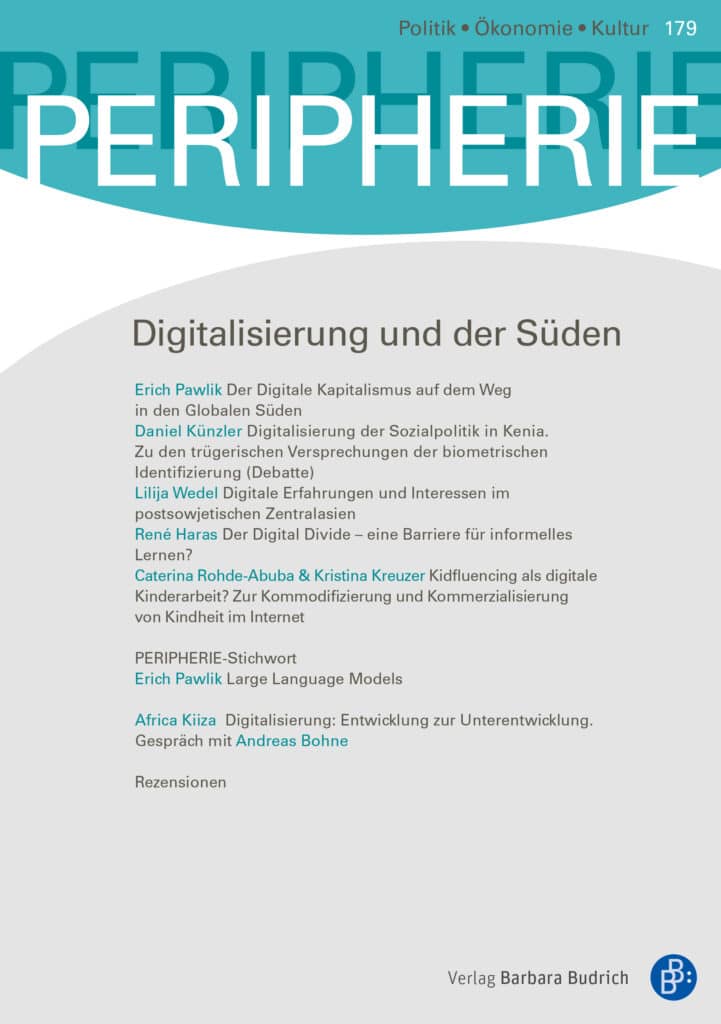
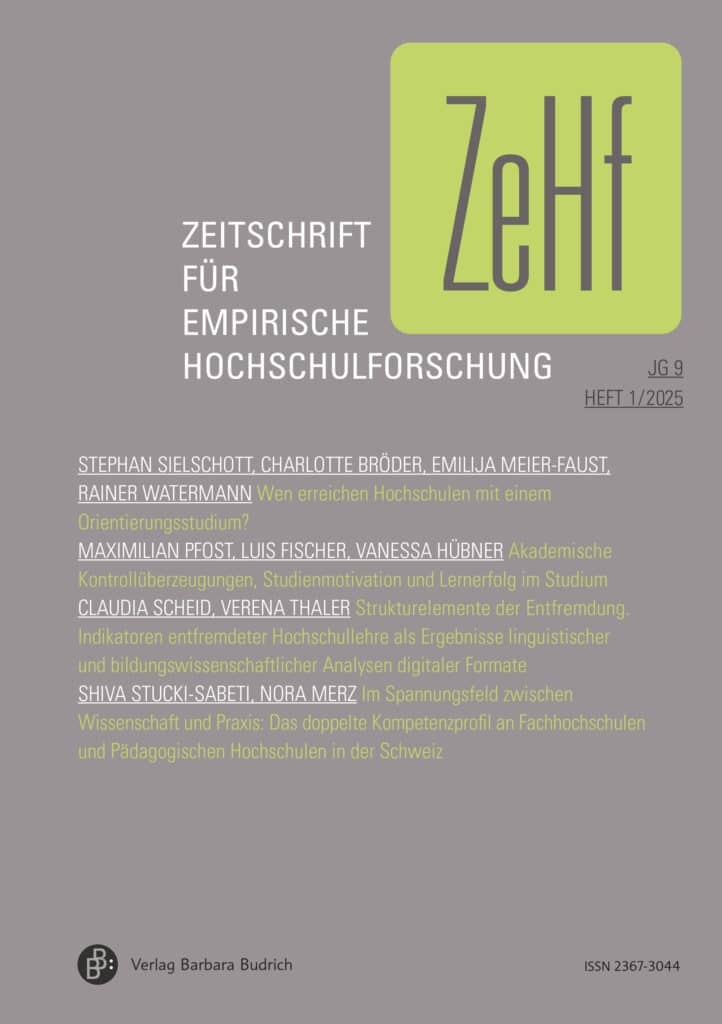
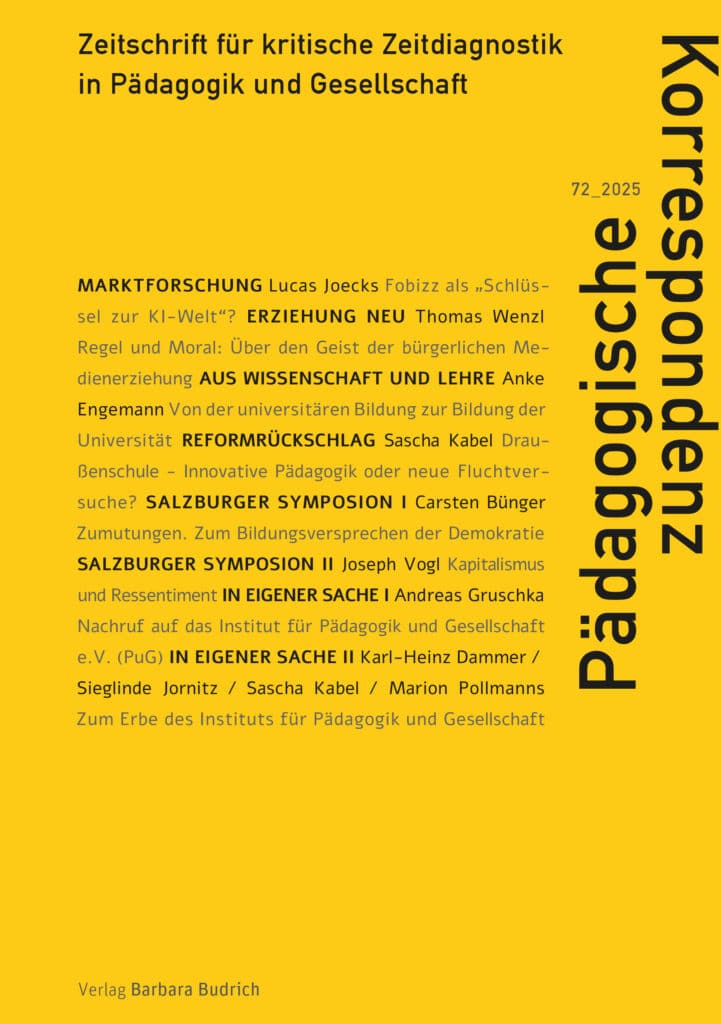
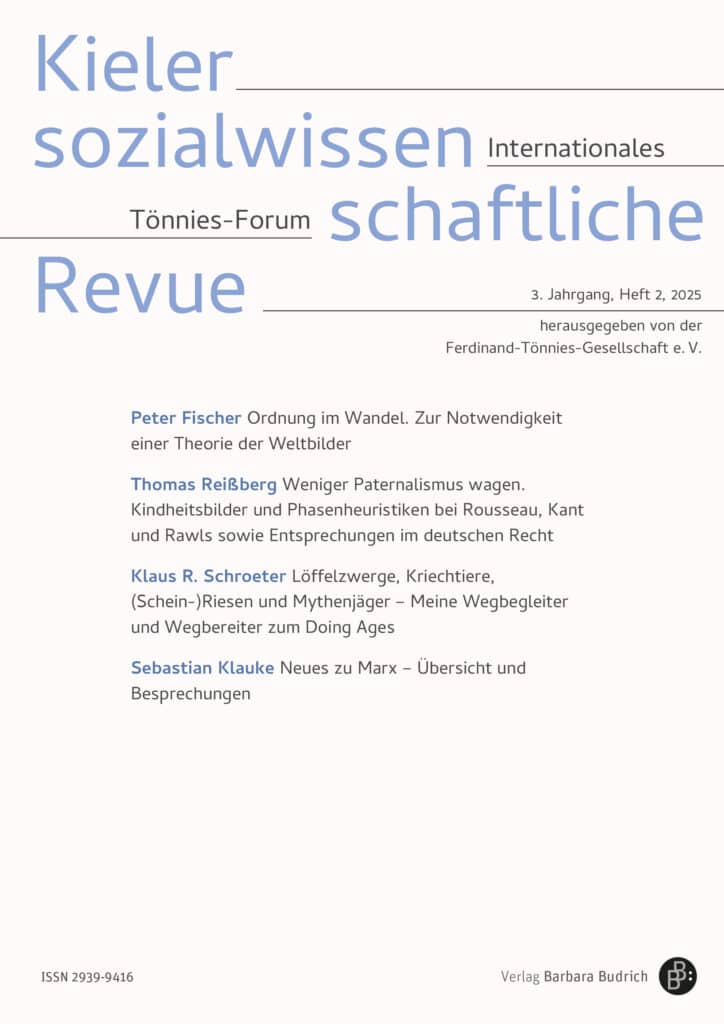
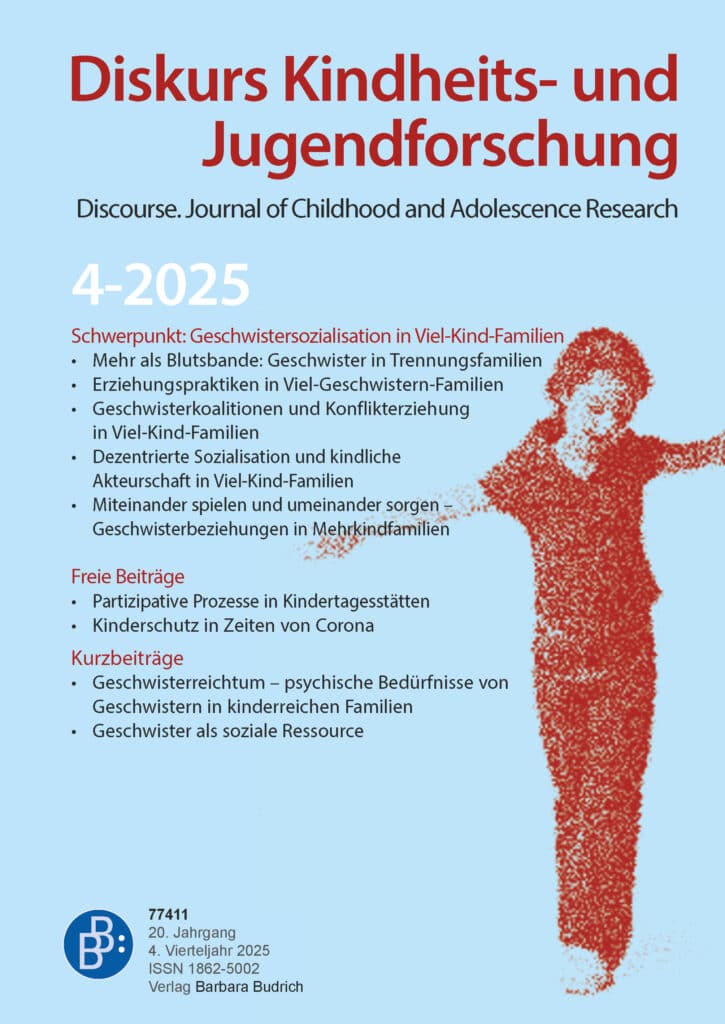

Bewertungen
Es gibt noch keine Bewertungen.